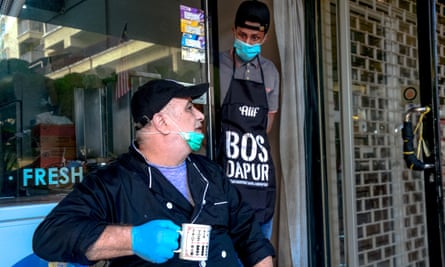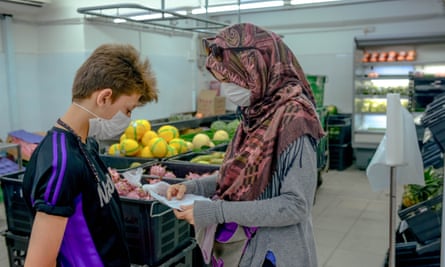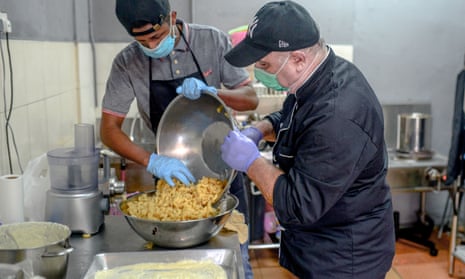In a small shop-turned-kitchen on the ground floor of a block of flats in Kuala Lumpur, Mohammad Jaber, 60, is preparing a feast: 20 portions of bechamel macaroni with minced chicken and lentil soup, accompanied by basbousa, a traditional semolina sweet cake he and his family often ate back in Syria before they fled to Malaysia in 2012.
“We have so many desserts in Syria, but Malaysians seem to like basbousa the most,” his 21-year-old son, Tarek Jaber, says.

Cooking is what Mohammad Jaber does. For almost 30 years before war broke out in Syria, he ran a restaurant in Damascus. Since 2013, he has been catering for restaurants and private events out of this small kitchen in Kuala Lumpur’s Taman Melati neighbourhood.
Now though, Mohammad and his assistant Mahmoud Mohammed Salad, a 22-year-old Somalian, are feeding a different community: frontline health workers at the Ampang hospital, a public healthcare facility in the Malaysian capital. They are part of a group of 15 refugees from Syria, Palestine, Yemen, Iraq and Afghanistan who have joined forces to feed those on the frontline of the Covid-19 crisis. Here, cases have risen above 4,000, and 70 deaths have been recorded.
Three weeks ago when the Malaysian government imposed a movement control order prohibiting the operation of all but essential services, two advocacy groups, the Syrian Al-Hasan Volunteer Network and Malaysian Beyond Borders Malaysia, put a call out to members of their community to form a refugee kitchen.
The response was immediate and overwhelming. “Just on the same day, 10 chefs came forward. We said we had nothing to pay them, but they said they wanted to help,” says Hasan Al-Akraa who founded the Al-Hasan Volunteer Network and launched the refugee kitchen with Malaysian film-maker Mahi Ramakrishnan.
“In the end, Mahi and I raised some funds and gave each of them enough for two days of groceries. They have responsibilities and children to feed.” They have now cooked more than 400 meals for nurses and doctors and other frontline staff since they opened their kitchen on 23 March.

The first time he took part, Jaber – who now cooks wearing gloves and a protective face mask – made mandi chicken with rice, a popular Arabic staple.
“My father feels it is his duty to provide services for the people of Malaysia who have been affected by this difficult situation,” Tarek says as his father stirs saucepans in the kitchen.
The refugee chefs – 12 women and three men – start cooking in the morning and have the food ready by 11am. A volunteer or hired driver picks it up and takes it to the health workers at the hospital. Al-Akraa helps to coordinate all this from his room at Nottingham University’s Malaysia campus, or even while out running errands.
Like Mohammad, Al-Akraa arrived in Kuala Lumpur from Syria in 2012, with his parents and four siblings. When he was 14, while trying to help his family, he was arrested by the Malaysian authorities for working at a restaurant without a permit. Although the Malaysian government works with NGOs to provide some assistance for refugees, it does not recognise them legally, meaning they have limited opportunities to study and work.

In detention for nine days, Al-Akraa met three Rohingya refugees who inspired him to start helping others when he was free. “I told myself I shouldn’t be complaining. At least I have a UNHCR refugee card, so I would be released, but they came by boat and didn’t have any documentation.”
At the refugee kitchen, the chefs rotate every day, and next on the rota is 43-year-old Elham Jaber Jasim Musawi. She prepares chicken macaroni – which she often cooks for her kids – with the help of her husband, Hussam Kadhim Younes Al Mohammedawi. Her 14-year-old son, Danial Husam Kadhim, had helped her with the shopping the day before.
Musawi left Baghdad with her husband and children in 2014 when Islamic State escalated its attacks in her country. Now they live in a three-bedroom flat in Kuala Lumpur’s Ampang neighbourhood. Lockdown has been hard for the family. The children watch TV and play football indoors to pass the time and Musawi is worried that the family won’t be able to pay their rent. Both her job at a local school and that of her husband have been affected by the restrictions on movement.

Still, she is happy to help. “This is an opportunity I wouldn’t have passed up for anything. It’s not always that we get a chance to do something meaningful. We are all thankful to the doctors and all other medical workers who sacrifice their lives to keep us safe,” she says.
The food is gratefully received by the nurses and doctors.
“Even though they’re not from our country, they want to help us while we carry out our work,” says Shuhaida Shuib, 42, a nurse at Ampang hospital. “I think that’s very compassionate and it means a lot in these difficult times.”
